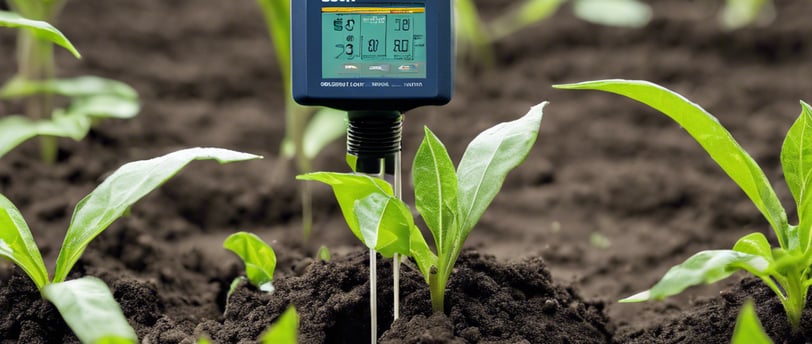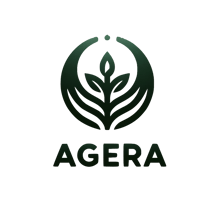Modernizing Agriculture: How Agera is Transforming Traditional Farming Practices in Nepal
Agriculture is deeply rooted in tradition, especially in countries like Nepal, where smallholder farmers have followed centuries-old methods for generations. While these practices have sustained communities for hundreds of years, modern challenges—ranging from climate change to resource inefficiency—demand a new approach. Enter Agera, a sensor-based farming system designed to modernize agricultural practices and revolutionize the way farming is done in Nepal. By integrating cutting-edge technology with traditional knowledge, Agera is leading a new era of precision agriculture.
AGRICULTURE PRACTICESSENSOR AND TECHNOLOGY
10/2/20244 min read


Traditional vs. Modern Farming Practices: The Need for Change
Traditional farming practices in Nepal, while effective in the past, are increasingly insufficient in today's rapidly changing environment. Farmers have long relied on instinct, seasonal patterns, and manual labor to guide decisions such as when to water crops, apply fertilizer, or harvest. However, erratic weather patterns, soil degradation, and fluctuating market conditions now challenge these age-old methods.
Without access to real-time data, farmers often face the risks of over-irrigation, poor soil management, and inefficient use of fertilizers, which leads to diminished yields and higher operational costs. At a time when Nepalese farmers need to increase productivity to keep pace with rising demand, Agera’s modern farming system is providing a way forward by introducing precision agriculture to the fields of Nepal.
What is Precision Agriculture?
Precision agriculture refers to the use of technology to monitor, analyze, and manage agricultural activities with a higher level of accuracy. By collecting data on variables such as soil moisture, temperature, nutrient levels (NPK), pH, and air humidity, farmers can make informed decisions tailored to the specific needs of their crops. Instead of relying on guesswork, precision agriculture enables farmers to apply water, fertilizer, and other inputs exactly where and when they are needed, leading to greater efficiency and higher yields.
Agera is at the heart of this revolution, offering farmers a 7-in-1 sensor-based system that provides real-time monitoring of soil and environmental conditions. This data is collected and analyzed through a cloud-based platform, which then offers actionable insights to help farmers optimize every aspect of their operations—from irrigation to pest management.
Key Advantages of Agera’s Modern Farming System
Efficient Water Use Water is one of the most critical resources for farming, especially in areas prone to drought or water scarcity. Agera’s sensors track soil moisture in real time, enabling farmers to know exactly when to irrigate and how much water to use. By optimizing irrigation schedules, farmers can reduce water waste and avoid over-irrigation, which often leads to soil erosion and nutrient runoff. This level of precision is especially important in regions where water is a limited and valuable resource.
Enhanced Nutrient Management Traditionally, farmers apply fertilizers based on general recommendations or seasonal practices, often leading to overuse or underuse. With Agera’s monitoring of soil nutrient levels (NPK), farmers receive accurate data on the soil’s nutrient status. This enables them to apply fertilizers only when needed and in the correct amounts, improving soil health and reducing environmental harm from excess fertilizers. This targeted approach not only boosts crop yields but also reduces input costs.
Real-Time Pest and Disease Alerts One of the greatest challenges in agriculture is the unpredictability of pests and diseases, which can devastate entire crops if not managed early. Agera’s system tracks environmental conditions such as air humidity, which can influence the likelihood of pest outbreaks or disease spread. Farmers receive real-time alerts when conditions are ripe for potential infestations, allowing them to take preventive measures before any visible damage occurs.
Climate Resilience The effects of climate change—unpredictable weather, extreme temperatures, and shifting seasons—are already being felt by farmers in Nepal. Agera helps farmers adapt to these challenges by providing data-driven recommendations on how to manage crops under changing conditions. Whether it’s selecting drought-tolerant crop varieties, adjusting planting times, or optimizing irrigation during heatwaves, Agera’s system equips farmers with the tools they need to build climate resilience into their operations.
How Agera is Modernizing Agricultural Practices in Nepal
Agera’s impact on farming in Nepal extends beyond individual farmers—it’s driving a larger shift toward data-driven agriculture. By partnering with farmer cooperatives, government bodies, and research institutions, Agera is scaling its technology to reach more communities. This collaborative approach ensures that farmers, even in remote areas, can benefit from modern agricultural practices that boost productivity and sustainability.
Improved Farmer Decision-Making With Agera’s web-based platform, farmers have access to easy-to-understand data visualizations and detailed reports that help them make more informed decisions. This system replaces the need for traditional guesswork, empowering farmers with the knowledge to make data-backed choices that maximize crop yield, reduce waste, and improve overall farm efficiency.
Sustainability in Focus Agera’s technology promotes sustainable farming by reducing the reliance on harmful agricultural practices such as over-fertilization and excessive water use. By encouraging resource efficiency, Agera helps protect the environment while improving long-term farm profitability. This approach is crucial for ensuring the future of agriculture in Nepal, where land and water resources must be carefully managed to sustain growing populations.
Affordable and Accessible Technology One of Agera’s key missions is to make advanced agricultural technology accessible to all farmers, regardless of the size of their operation. Through a subsidized pricing model and flexible subscription plans, even smallholder farmers can take advantage of Agera’s sensor-based solutions. This inclusivity ensures that modern farming practices are not limited to large-scale commercial farms, but are available to everyone.
Collaboration and Education Agera is not just a technology provider—it’s an enabler of community-driven agricultural improvement. Through partnerships with cooperatives, research organizations, and government programs, Agera offers training and education to farmers, helping them understand how to make the most of modern farming systems. This focus on capacity building ensures that farmers can confidently adopt and sustain new practices, leading to better outcomes for their families and communities.
Conclusion: The Future of Agriculture is Here
The future of farming in Nepal lies in the fusion of traditional knowledge with modern technology. Agera’s sensor-based farming system is transforming agricultural practices by enabling farmers to harness the power of real-time data. From efficient resource use to building climate resilience, Agera is at the forefront of the next agricultural revolution—one that prioritizes sustainability, precision, and productivity.
As more farmers adopt Agera’s technology, the future of Nepal’s agricultural sector looks brighter than ever. By empowering farmers to make informed, data-driven decisions, Agera is helping create a sustainable, productive, and profitable future for farming in Nepal.



